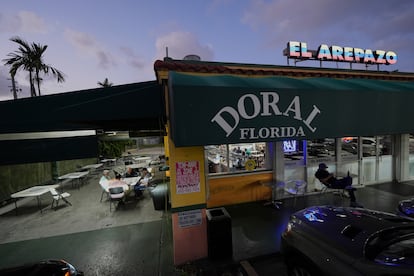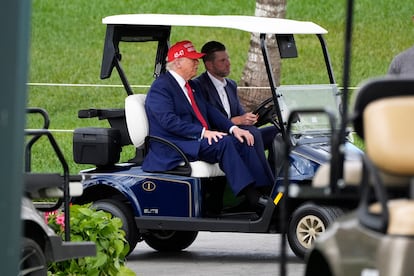Doral ‘betrays’ its community: Local police will collaborate with ICE to detain migrants
The city, which has the largest Venezuelan population in the country, is finalizing an agreement with the federal immigration agency to allow local authorities to question, detain, and prosecute people suspected of violating immigration laws


The city of Doral, in Miami-Dade County, fears it will never be the same again. Some say businesses and streets will empty out, that people will stay silent about violence rather than report it, and that fear will spread among the immigrant community. When police officers begin working hand in hand with Immigration and Customs Enforcement (ICE), as local authorities are planning, the Venezuelan stronghold in the United States will become a dangerous place for its residents.
“I can only think about the fear, the distrust this will cause among people,” says Venezuelan Adelys Ferro, executive director of the liberal Venezuelan American Caucus. “The mere possibility that the police will begin to collaborate directly with ICE is worrying, devastating.”
Uncertainty has taken hold among city residents ever since it became known that Doral’s City Council is close to finalizing an agreement with ICE that would authorize local police to carry out duties that legally belong to immigration authorities: questioning, detaining, and processing immigrants. A report from the Miami Herald states that this collaboration is expected to be approved on Wednesday.
According to local officials, the agreement “is not intended to criminalize the immigrants living in Doral.” However, residents of the city known as “Doralzuela” — where 40% of the population is of Venezuelan origin and 70% was born outside the country — fear what a pact between ICE and local police might mean for their community. Doral is home to the largest population of Venezuelan immigrants in the United States, many of whom strongly supported Donald Trump in last November’s election. That’s why Ferro believes this new measure is “a betrayal of the trust Venezuelans placed in their local authorities.”
This is not the first policy targeted at immigrants — and particularly the Venezuelan community — in the United States. It’s a fact that, among all undocumented groups, Venezuelans were not only especially criminalized during the election campaign, but also among the first to be affected by the new administration’s immigration policies.
Once in the White House, Trump ordered the suspension of Temporary Protected Status (TPS) for Venezuelans. The move — which has been blocked by the courts — affects around 300,000 Venezuelan migrants. Hundreds of thousands more have faced the fear of receiving notices to “self-deport,” after losing the benefits they had been granted through programs such as humanitarian parole or the CBP One app. Another 200 were deported to a mega-prison in El Salvador without due process, accused of being criminals — even though the vast majority had no criminal record.

Ferro firmly believes that the Trump administration has used Venezuelans to send a message to the rest of the immigrant community, as part of its mission to carry out the largest deportation effort in U.S. history. “We’ve been the narrative that helps support one of President Trump’s campaign promises — the easiest group to use as the focus of all this rhetoric,” she says.
The criminalization of this group has been possible because the Venezuelan diaspora is “the newest” to have crossed the border en masse, according to Ferro. “We are the most vulnerable community, with hardly any representation in this country — we don’t even have a trade relations office,” she explains. “We’ve endured a ruthless attack from Trump and his entire team. We were the perfect target — no one was going to speak out to defend us.”
Trump knows he has Florida’s doors wide open to him and his team, especially with the backing of Governor Ron DeSantis, who has been pressuring state police departments to join programs that empower them to enforce immigration law.
It’s not just Venezuelans who will be affected by the alliance allowing police to act like ICE agents — the entire immigrant community in the state, where nearly six million people are Latino, will feel the impact. Section 287(g) of the Immigration and Nationality Act, which allows this type of cooperation, was suspended in 2012 after it was found that the provision had led to widespread illegal and indiscriminate raids and detentions in Hispanic communities. However, on January 30, 2025, ICE once again turned to the 287(g) program, signing its first agreement under the new Trump era.
Still, the Miami Herald notes that although there are three types of 287(g) programs, “it’s not clear which type Doral will join.” Some Florida cities that have already adopted the measure — such as Coral Gables, Hialeah, Miami Springs, West Miami, and Key West — have implemented the “Task Force” model, which allows police to interrogate and detain any undocumented person “or anyone they believe to be a foreigner.” In the past, this program has been accused of being discriminatory.
Ferro believes the fear people will be experiencing in this area of Miami is still incalculable. “It’s going to grow to proportions I can’t even describe,” she says. “People are already terrified, and every time they see a police officer, they’ll get nervous. This is going to hurt businesses, people will stop going out, stop spending time with their families. Police should be allies of the community, a force people can rely on and trust — but now they’ll become a symbol of fear for a huge number of people. Public safety overall will suffer, because people won’t trust the police,” she laments.
Sign up for our weekly newsletter to get more English-language news coverage from EL PAÍS USA Edition
Tu suscripción se está usando en otro dispositivo
¿Quieres añadir otro usuario a tu suscripción?
Si continúas leyendo en este dispositivo, no se podrá leer en el otro.
FlechaTu suscripción se está usando en otro dispositivo y solo puedes acceder a EL PAÍS desde un dispositivo a la vez.
Si quieres compartir tu cuenta, cambia tu suscripción a la modalidad Premium, así podrás añadir otro usuario. Cada uno accederá con su propia cuenta de email, lo que os permitirá personalizar vuestra experiencia en EL PAÍS.
¿Tienes una suscripción de empresa? Accede aquí para contratar más cuentas.
En el caso de no saber quién está usando tu cuenta, te recomendamos cambiar tu contraseña aquí.
Si decides continuar compartiendo tu cuenta, este mensaje se mostrará en tu dispositivo y en el de la otra persona que está usando tu cuenta de forma indefinida, afectando a tu experiencia de lectura. Puedes consultar aquí los términos y condiciones de la suscripción digital.








































